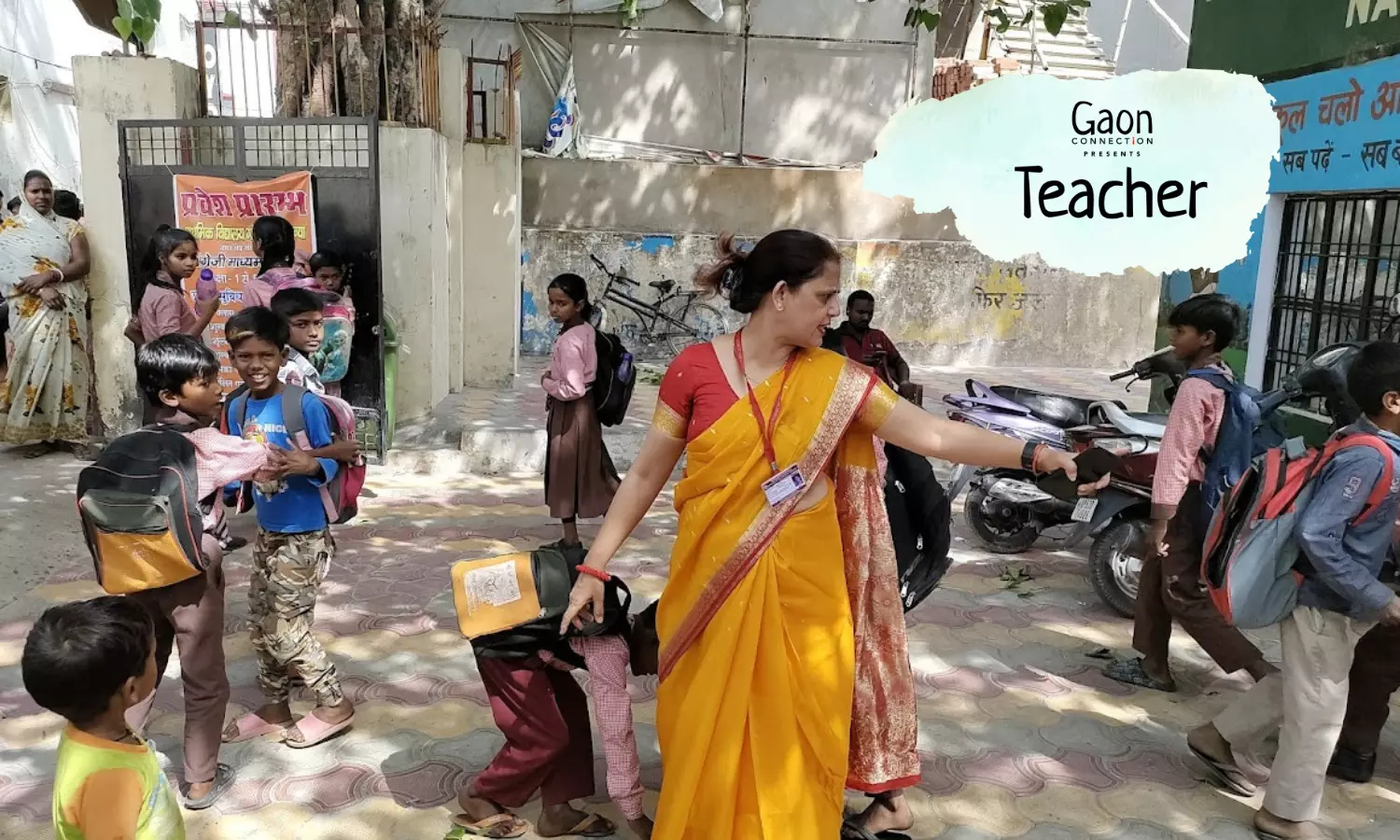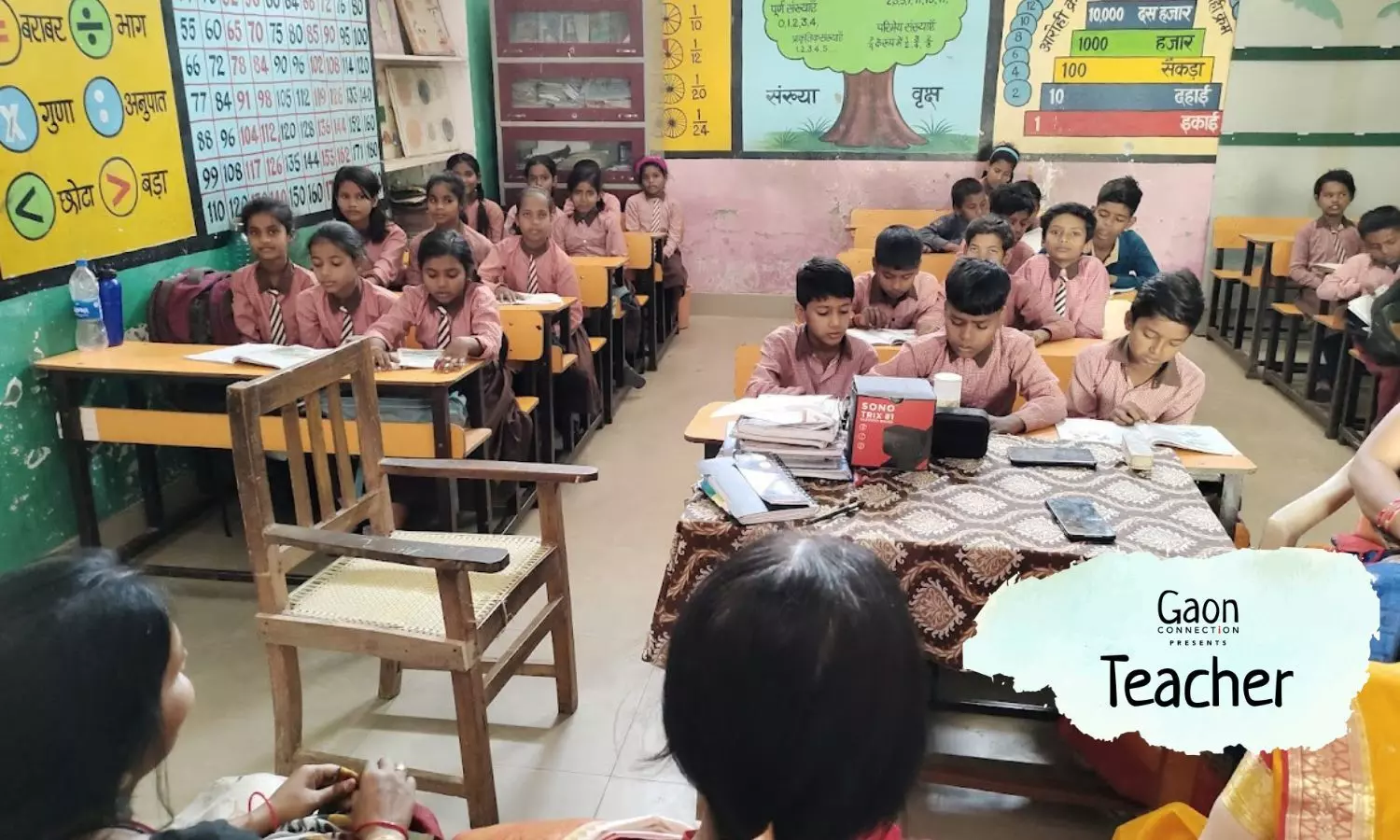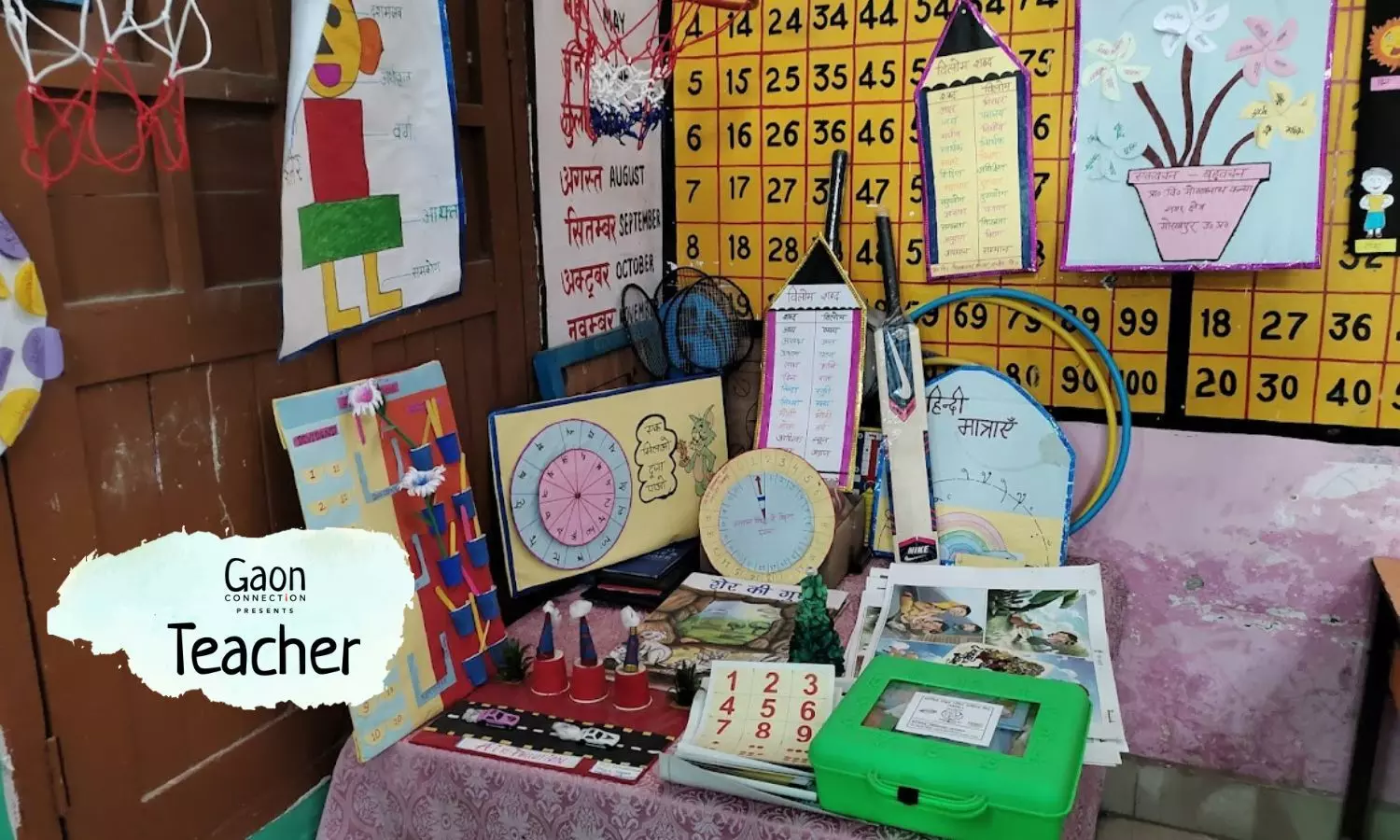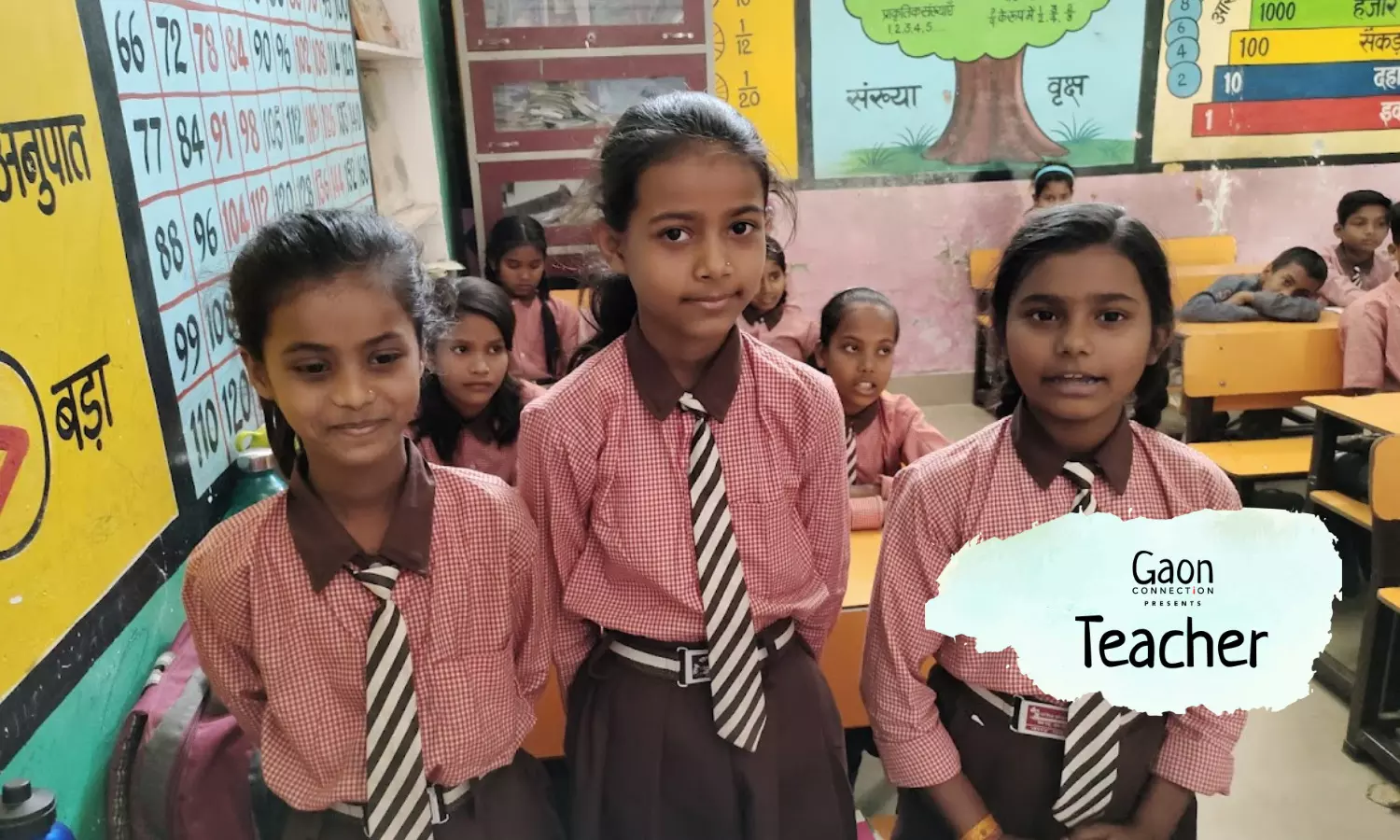Gorakhpur, Uttar Pradesh
As she shepherds her eight and nine year old students out of the classroom at the end of the school day, Mamata Pandey knows that her duties as a teacher are far from over, and she will be working late into the night.
“I enjoy the peace and quiet of the night and I am most creative then,” smiled Pandey. That is when she pores over her lesson plans, and depending on the concepts to be taught the following day, she plans activities for her students.
The 260-page lesson plan book is her friend, guide and saviour since 2019, said the 46-year old assistant teacher at the Primary School Kanya. She joked that she never strayed far from the book provided by the state government that has visual references and recommendations as to how to conduct a class.
“The lesson plan focuses on specific learning outcomes and explains how certain concepts can be taught in class in a way the students can understand them,” Pandey told Gaon Connection. The plan explains in detail what is to be done for every competency to be taught. It also describes the TLM (teaching learning material) to be used, what examples to be referred to from the book, and workbook exercises to build competency.
The primary school where Pandey teaches stands next to the famous Gorakhnath Temple in Gorakhpur, Uttar Pradesh. The students come from nearby colonies, and the assistant teacher waits to welcome her students every morning as they troop in through the large iron gates into the assembly area. After assembly they go into the classrooms. And that is when the magic of lesson plans starts to unfold, period after period.

Pandey teaches class three and has 53 students in her class. The activities she conducts in her classroom stem from the lesson plans, and she uses them effectively as an ice-breaker. It helps children get along with each other and encourages children who are shy to open up.
“I sat on the back bench on my first day as I was very shy. As it happened I met a classmate who had the same name as me and we became friends,” Aryan Yadav, one of her students, told Gaon Connection. “Ma’am regularly conducts quiz competitions in the class and we both team up and answer questions after consulting each other. These competitions have made me confident, and I have lost my shyness,” Aryan said.
The quizzes, as recommended in the lesson plan book, are a big hit with Pandey’s students. “I feel good when a correct answer from me leads to a win for my team. My friends depend on me for the right answer and that makes me study harder,” Dilshad Alam, another student, told Gaon Connection.
These competitive question/ answer games are a fun way of learning and remembering new facts, much more than just learning boring data by heart, Pandey said.
Pandey incorporates activity-based pedagogies, as suggested by the lesson plan. Apart from quizzes she also uses story-telling, art and craft and so on. It is a part of her teaching strategies in the classroom.
NIPUN Bharat promotes use of lesson plans
The use of lesson plans is strongly recommended by NIPUN (National Initiative for Proficiency in Reading with Understanding and Numeracy), as one of its micro-practices. The NIPUN scheme focuses on strengthening foundational literacy and numeracy skills, commonly known as FLN, in students studying in classes one to three. And, it offers very specific guidelines through lesson plans to help the teacher inculcate these skills in her students.
Whether it is helping students remember the names of fruits, vegetables or animals, or asking them to think up words starting with a specific letter, Pandey keeps her classes entertaining and at the same time educational. Guided by the lesson plans, through an array of activities, she helps her students enhance their communication, creative thinking and critical thinking abilities, and of course firmly grasp basic concepts.

The use of lesson plans is strongly recommended by NIPUN (National Initiative for Proficiency in Reading with Understanding and Numeracy), as one of its micro-practices.
“How and what to teach cannot be thought of at the spur of the moment while in class. Everything has to be planned in advance,” said Pandey. She takes cues from the lesson plans and then goes ahead with activities associated with the concept to be taught. “It could be something to do with numbers, words, names of flowers…”, she told Gaon Connection.
For example, if it is a carry-over addition that week, the aim is to help the students grasp the concept in a certain time frame, she explained. “The time frame is flexible. Certain concepts take longer than others to be taught and understood, but that is okay,” she said.
Pandey uses real-life examples of borrowing and lending money, or sharing fruits or chocolates amongst friends, etc. to get the students to understand some of the fundamental concepts in mathematics.
Day wise and week wise schedule
The lesson plan offers the teacher a weekly schedule to follow broadly.
“For the first four days of the week, we study new lessons and we revise everything on Friday. Then Saturday is the assessment day, a day we are all slightly nervous about,” student Aryan Yadav, told Gaon Connection. “We have class tests and Ma’am can tell who has not been able to grasp what we have been taught that week. Chhutti ke baad kabhi kabhi rukna padta hai [We sometimes have to stay back after school during remedial classes],” the student added.
“The assessment day gives us teachers an idea about the students’ performance and helps us organise remedial classes. Without the weekly assessment, it is impossible to work on remediation, which is critical to ensure the child is grade-level competent” Pandey said.
The weekly assessments also reassure parents of the students’ performance. “Earlier, I could never tell what my son Dilshad was doing in class and if he was learning anything at all. But now, the organised structure to the class and teaching keeps me abreast of his progress,” Junaid Alam, a parent, told Gaon Connection.
Apart from the weekly plan, there is a daily plan as well. Pandey’s classes are divided into eight periods a day. The first three periods are dedicated to language while the last three periods are for numeracy skills, Pandey explained. “I use the two periods in between for other lessons such as personal hygiene, general knowledge, and classroom discussions,” she said.
I do, You do, We do
As per the lesson plan book, Pandey follows the teaching practice norm of ‘I do, You do, We do’. “I first show how to add two numbers. After that, I invite a student to do the same. Then, the entire class chips in to repeat the answer in one voice. This creates a feeling of oneness in the classroom,” said Pandey.
“This is so different from how I was taught in a government school in my childhood. I am so glad the ‘top-down approach’ no longer exists,” said the assistant teacher. “Today, our main task is to draw out all students and involve them in class activities and make them feel a part of the whole. This has a remarkably positive impact on the students,” she said.

From concrete to abstract
One of the key principles of lesson plan-based learning is the flow of instructions from the concrete to the abstract. This involves four main stages — experience, language, picture and symbol. The experience is concrete while the symbol is abstract.
“Ma’am first names two lesser known fruits such as strawberry (the concrete element). Then, she tells us what the fruit is called in Hindi and English (language element). She shows us an image of the fruit [picture element] and then uses all that to teach us how to add or subtract the number of fruits [symbol],” Himanshu Rao, a student, explained to Gaon Connection how he learnt addition and subtraction.
Life lessons through lesson plan
The ‘competency-based learning’ aspect of the lesson plan ensures students inculcate competitive behaviour without giving rise to negativity in the classroom.

Anushka Rajmati (first from left) asserts that the girls in the classroom are more knowledgeable than the boys.
“Sometimes the urge to win at a quiz contest gets intense, and some children take a loss badly. But, competition can also teach the children about winning and losing,” Pandey said. Healthy competition is a good thing, she reiterated, as she turned around to calm down a fierce argument that had broken out between the girls and boys in the class.
“The girls don’t let us boys speak,” Aryan Yadav complained, and was immediately shouted down by Anushka Rajmati, his classmate. “That’s because we know more answers than you do,” she retorted.
Laughing out loud, Pandey asked, “Do you see how competition gives the children the ability to navigate both successes and failures, hold their own and work as a team at the same time?”




















